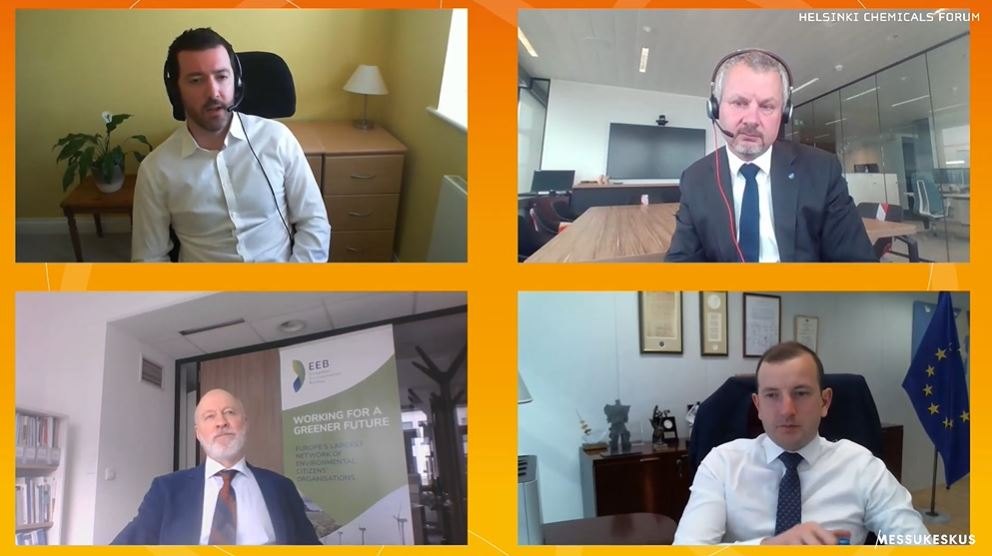Innovation is the answer to a quadruple challenge the chemical industry is facing now

How ambitious is the EU chemicals policy? EU Commissioner for Environment Virginijus Sinkevičius, Secretary General of the European Environmental bureau Jeremy Wates and Cefic Director General Marco Mensink held a high-level debate at the Helsinki Chemicals Forum earlier this week on the challenges of implementing The EU Chemicals Strategy for Sustainability.
The EU Chemicals Strategy for Sustainability adopted by the European Commission in October 2020 proposes more than 80 legislative and non-legislative measures to further improve protection of people and environment from the harmful effects of chemicals and incentivise production of sustainable substances. The Strategy also introduces a series of new concepts into EU regulatory framework including a concept of regulating chemicals based on their “essential use” and shifting towards “safe-and-sustainable by design” substances.
Cefic shares the same goals as the Commission which is to maintain a system that provides a high level of protection for people and the environment and supporting the industry’s investments into safer and more sustainable substances on European soil, yet the Strategy comes at a very challenging time.
“If you look at the Green Deal which the chemical industry supports, we are probably the only sector that faces a quadruple challenge. In addition to green and digital transition that all other sectors have to undergo, we also have a circularity challenge and Chemicals Strategy for Sustainability to comply with between now and 2050”, explained Marco Mensink during the debate.
Pointing out an unprecedented volume of regulatory change coming up over the next few years, Cefic Director General also emphasized the need to sequence all steps to make sure that the necessary investments are made early in the process.
“Innovation is what will give the chemical industry an opportunity to make this change. It is the biggest regulatory overhaul since REACH, it is bigger than REACH. And the industry will need to innovate its way out. This is where the concept of “safe and sustainable by design” could help and it needs to be brought forward.” – Cefic Director General Marco Mensink
Both Jeremy Wates and Commissioner Sinkevicius agreed that innovation will be extremely important to achieve the ambition of the Strategy.
“Our ambition is high but it is realistic. In this Strategy we combine an ambition for increasing protection while promoting an innovation agenda for safe and sustainable chemicals at the same time; that allows the industry to remain competitive and plan for the future… Stimulating safe and sustainable by design will boost innovation and create new market for our industry ” – EU Commissioner for Environment Virginijus Sinkevičius.
The discussion also touched upon an important topic of a growing regulatory gap between the EU and other regions in the world which have a less advanced chemicals legislation. Maintaining the competitiveness of the EU industry in this regard will be an important issue to consider.
Commissioner Sinkevicius emphasised the role of the EU as a global standard setter for ambitious policies to better protect environment and people. Marco Mensink noted that the key question is not only how to make the EU chemical industry more sustainable but how to make other regions follow the EU lead.
The debate showed that the adoption of the Strategy was just a starting point and more discussion will be needed to work out its implementation. As the roll-out of the Strategy will affect not only the chemical industry but all value chains using chemicals, careful assessment of its impacts will be paramount to the success of the Strategy. This is where a recently established multi-stakeholder High Level Roundtable on the implementation of the Chemicals Strategy should play an important role.
In addition to this high level debate, the Helsinki Chemicals Forum, a well-known annual event for regulatory professionals from the chemical industry, featured five various panel discussions on other highly relevant issues for the chemical industry – from a new international chemicals management framework post 2020 to traceability of chemicals along the supply chain.
If you have missed the conference, all panel discussions and keynote speeches can be accessed (for a fee) here.